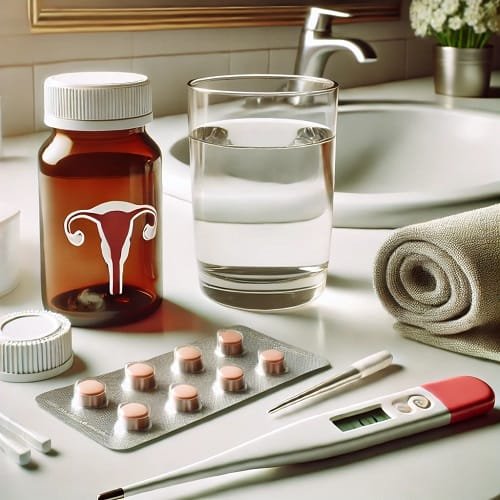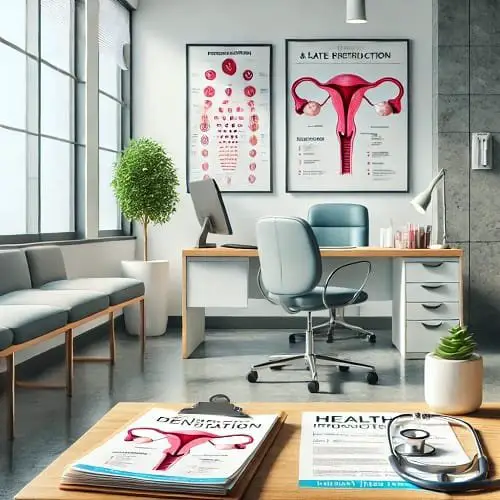Introduction
If you’ve ever wondered, “Can a UTI cause a late period?”, you’re not alone. This is a common concern among women, as both urinary tract infections (UTIs) and menstrual cycle changes can have a significant impact on health. While a urinary tract infection typically affects the bladder, kidneys, and urethra, it can also have unexpected effects on other bodily systems, including the menstrual cycle.
In this article, we’ll explore how a UTI might influence your period, the connection between UTI symptoms and delayed period, and the broader picture of hormonal imbalance that could result from such an infection. Though UTI and period delay are not directly linked, it’s important to understand how stress from infection or changes in the body’s response to illness could lead to period changes or a late period.
We’ll dive into the signs of a UTI, explore the mechanisms of how it might affect your cycle, and highlight the key differences between UTI-related hormonal disturbances and other late period causes. By the end, you’ll have a clear understanding of whether or not a UTI is the culprit behind your delayed period, and what steps you can take for relief.
Stay with us as we explore this often-overlooked connection between UTI symptoms and menstrual health!
Table of Contents
Understanding UTIs and Their Symptoms

A urinary tract infection (UTI) is one of the most common infections that affect women. It occurs when harmful bacteria enter the urinary system, typically through the urethra, and begin to multiply in the bladder. Though UTIs can affect the bladder, they can also spread to the kidneys or the urethra, leading to a more severe kidney infection. When left untreated, a UTI can cause serious complications, but early UTI treatment is typically straightforward with antibiotics.
The most common UTI symptoms are easy to spot, and they typically include painful urination, a frequent and urgent need to urinate, and discomfort in the lower abdomen. Some women may also notice blood in urine, which could make urination feel more painful or urgent. Frequent urination is another hallmark of a bladder infection, and some women also report a cloudy or strong-smelling urine, which is often accompanied by a sense of fatigue or fever if the infection is severe.
While a UTI primarily affects the urinary system, it can also have an indirect influence on your menstruation. This is particularly true if the infection causes stress or hormonal imbalances in the body. The body’s immune response to the infection could interfere with the hormonal processes that regulate the menstrual cycle, potentially leading to a delayed period.
In some cases, the discomfort caused by a UTI might result in changes to eating, sleeping, or stress levels—each of which can influence period timing. As we will explore, UTI and menstruation can be linked in a variety of ways, but understanding the symptoms of UTI and how the body responds is the first step toward recognizing potential connections.
Now that we’ve covered the basics of UTIs, let’s explore how they might impact your period and whether or not they can cause a late period.
The Menstrual Cycle and Its Sensitivity

To understand whether a UTI can cause a late period, it’s essential to first understand how the menstrual cycle works and what can disrupt it. The menstrual cycle is a complex process that typically lasts about 28 days, although it can vary from person to person. It involves several key phases that are controlled by hormonal fluctuations, primarily the hormones estrogen and progesterone. These hormones work together to regulate ovulation, the thickness of the uterine lining, and the timing of menstruation.
The cycle begins with the follicular phase, during which estrogen levels rise, leading to the maturation of an egg in the ovaries. This phase is followed by ovulation, where the egg is released. After ovulation, the luteal phase begins, characterized by an increase in progesterone to prepare the uterus for potential pregnancy. If fertilization doesn’t occur, progesterone levels drop, triggering the shedding of the uterine lining, known as menstruation.
Any disruption in this finely tuned process can lead to menstrual irregularities or even a period delay. Hormones are incredibly sensitive to external influences, which is why hormonal imbalance can lead to changes in the cycle. Stress, travel, illness, or significant changes in weight can all contribute to cycle disruption, resulting in delayed or missed periods.
This is where a UTI might come into play. While it’s not a direct cause of period delay, the stress and discomfort of dealing with a bladder infection or kidney infection can impact hormonal balance, potentially leading to menstrual irregularities. Stress from illness or pain can trigger the body’s stress response, which often interferes with the normal hormonal fluctuations needed for regular menstruation.
With this in mind, let’s explore how a UTI might directly or indirectly affect the timing of your period, potentially resulting in a late period.
Can a UTI Cause a Late Period?

Now that we have a good understanding of UTIs and the menstrual cycle, let’s address the big question: Can a UTI cause a late period? The short answer is: While a UTI is not a direct cause of a late period, it can potentially lead to a period delay under certain circumstances.
When a UTI occurs, the body’s immune system becomes activated in an attempt to fight off the infection. This immune response triggers the release of various chemicals, including cytokines, which are molecules that help control inflammation and the immune system. While cytokines play a vital role in fighting infections, they can also affect other bodily systems, including the menstrual cycle.
For instance, the UTI and menstrual cycle are indirectly linked through the stress response. When the body is under stress due to illness, infection, or pain, the production of stress hormones like cortisol increases. This hormone can interfere with the delicate hormonal balance of estrogen and progesterone that regulates the menstrual cycle. As a result, the fluctuation in these hormones can cause period delays or menstrual irregularities.
In addition, UTI infection symptoms affecting period timing can also include factors like fatigue, discomfort, and even changes in appetite, all of which can further affect the body’s normal rhythm. The stress and periods connection is well-documented, as emotional or physical stress from any source can delay or alter the menstrual cycle. If you’re dealing with a bladder infection or kidney infection, your body may be under significant stress, which in turn can disrupt the regularity of your period.
Although a UTI isn’t a direct cause of a late period, the body’s response to infection—whether through stress, inflammation, or hormonal shifts—can certainly cause temporary disruptions in the menstrual cycle. These disruptions are often short-lived, and once the infection is treated, your cycle should return to normal. However, if the stress from the UTI persists or if the infection is recurrent, you may experience ongoing period irregularities.
To sum up, while the UTI and period delay connection isn’t a straightforward one, the stress and immune response triggered by the infection can influence your hormonal balance, leading to a delayed period. This is why, if you’re dealing with a UTI, you might notice your period arriving a little later than usual. However, once the infection clears up, your cycle should normalize.
ALSO READ
Clicking Sound While Breastfeeding: Why It Happens
Laser Hair Removal While Breastfeeding: Is It Safe or Risky?
Healthy Protein Balls for Breastfeeding Moms
Can I Take Creatine While Breastfeeding? Key Facts
Other Factors That Could Cause a Late Period

While UTIs can sometimes cause a late period, they are not the only factor that can disrupt your menstrual cycle. There are many other reasons why you might experience a period delay, and some of these factors can overlap with UTI-related hormonal changes, making it tricky to determine the true cause of a late period.
One of the most common causes of a late period is stress. Emotional or physical stress can trigger the release of cortisol, the body’s primary stress hormone, which can interfere with the normal functioning of the hormones responsible for regulating the menstrual cycle. Stress and period delay are well-documented, and when your body is under stress, it can postpone ovulation or delay menstruation altogether.
Another factor that can affect your period is weight changes. Significant weight loss or weight gain can disrupt hormonal balance and interfere with the regularity of your cycle. For instance, women with low body fat or who are underweight may experience irregular periods or even stop menstruating altogether. Conversely, rapid weight gain, often linked to conditions like PCOS or thyroid issues, can also lead to a delayed period.
Speaking of PCOS (Polycystic Ovary Syndrome), this condition is known for causing menstrual irregularities. Women with PCOS often experience hormonal imbalances that can result in longer or skipped periods. Similarly, thyroid problems, whether due to hypothyroidism or hyperthyroidism, can also interfere with the regulation of the menstrual cycle, leading to period delays.
Of course, pregnancy is one of the most common causes of a late period. If you’re sexually active and experience a period delay, pregnancy should always be considered, especially if you miss a period completely. A UTI and pregnancy can sometimes have overlapping symptoms, such as frequent urination, which might cause confusion about the true cause of a late period.
As you can see, there are many potential causes of a late period, from stress to PCOS and thyroid problems. UTIs and these other factors might overlap, leading to some uncertainty. If you suspect a UTI but have also been experiencing other symptoms, it’s always a good idea to consider these other possibilities.
When Should You See a Doctor?

If you’re wondering, “Can a UTI cause a late period?”, and are experiencing symptoms of a UTI, it’s important to know when you should seek medical attention. While a UTI may cause a late period due to stress or immune response, untreated or severe infections can lead to complications that require medical intervention.
Firstly, if you’re dealing with a UTI and you notice symptoms like painful urination, frequent urination, or blood in urine, it’s essential to seek treatment right away. If these symptoms escalate or you develop new signs, such as a fever, chills, or back pain, this could indicate that the infection has spread to your kidneys, leading to more serious UTI complications. Kidney infections can be severe and require immediate medical attention, so don’t hesitate to consult a healthcare provider if you’re experiencing these symptoms.
In addition, if you suspect that your UTI is affecting your period or causing a late period, it’s important to track your menstrual cycle closely. If a late period becomes a frequent occurrence or if your periods are consistently irregular, it may be a sign of an underlying health condition, such as hormonal imbalance, PCOS, or thyroid issues. In these cases, seeking medical advice is crucial to rule out any other potential causes and get the appropriate period consultation.
Moreover, if you’re unsure whether a UTI is the cause of your late period or if the urinary infection treatment isn’t improving your symptoms, a healthcare provider can provide clarity. A doctor may perform tests to ensure the infection has cleared up and to investigate any possible underlying factors affecting your cycle.
In summary, if you notice severe UTI symptoms, experience recurrent period delays, or if your menstrual irregularities persist, don’t hesitate to seek professional help. Early medical advice can ensure timely treatment and address both UTI and menstrual health concerns.
Preventing UTIs and Period Irregularities

While UTIs can sometimes cause a late period, there are steps you can take to prevent both urinary infections and period irregularities. By adopting a few healthy habits and making positive lifestyle changes, you can improve both your menstrual health and urinary system function.
First and foremost, staying hydrated is key. Drinking plenty of water helps flush bacteria from the urinary tract, reducing the likelihood of infection. Additionally, urinating after sex can help clear any bacteria that may have entered the urethra during intercourse, lowering the risk of a UTI. Practicing good hygiene, such as wiping from front to back, can also help prevent bacteria from spreading and causing infections.
To support menstrual health, consider incorporating stress management techniques, such as yoga, meditation, or regular exercise, to keep stress levels in check. Since stress is a common factor in both UTIs and period delays, reducing it can help maintain hormonal balance and promote regular periods. Additionally, eating a balanced diet rich in fiber, healthy fats, and vitamins will support hormonal regulation, further contributing to period regularity.
By following these practical tips for UTI prevention and maintaining a healthy lifestyle, you can reduce the likelihood of experiencing both UTIs and late periods, keeping your body in optimal health.
Frequently Asked Questions (FAQs)
Can a UTI delay a period by several days?
Yes, a UTI can potentially cause a period delay, although it’s not the most common reason for a late period. When your body is fighting an infection, stress and hormonal disruptions can occur, which might lead to a delay in menstruation. However, this is usually a temporary effect, and your period should return to normal once the infection is treated.
How do I know if my late period is caused by a UTI?
If you have symptoms of a UTI, such as painful urination, frequent urination, or blood in urine, and your period is late, it’s possible that the infection is affecting your menstrual cycle. However, since other factors can also cause a period delay, it’s important to consult a doctor for a proper diagnosis and treatment.
Should I worry if my period is late and I have a UTI?
While a UTI can contribute to a late period, it’s usually not a cause for major concern, especially if the infection is treated promptly. However, if your period delay continues after the UTI treatment, or if you notice other symptoms, it’s wise to see a healthcare provider to rule out any other potential causes.
Can a UTI cause a missed period?
A UTI alone is unlikely to cause a completely missed period. However, the stress and hormonal changes caused by fighting off an infection could potentially disrupt the menstrual cycle, leading to a delay or irregularity. If your period doesn’t arrive after a delay, it may be due to other factors, and it’s advisable to track your cycle and consult a doctor for further guidance.
Can a UTI cause menstrual cramps or period-like symptoms?
Yes, sometimes the symptoms of a UTI can mimic period-like cramps. The inflammation and discomfort in the pelvic region caused by the urinary infection can feel similar to the cramps you experience during menstruation. However, if you’re unsure whether the symptoms are related to your UTI or menstrual cycle, it’s best to consult a healthcare provider to avoid confusion and ensure proper treatment.
Conclusion
In conclusion, while a UTI can cause a late period, it typically does so indirectly by influencing hormonal balance and causing stress on the body. Other factors, such as stress, hormonal imbalances, and underlying health conditions, can also contribute to period delay. If you’re experiencing persistent menstrual irregularities along with UTI symptoms, it’s always best to consult with a healthcare provider for accurate diagnosis and appropriate UTI treatment.






